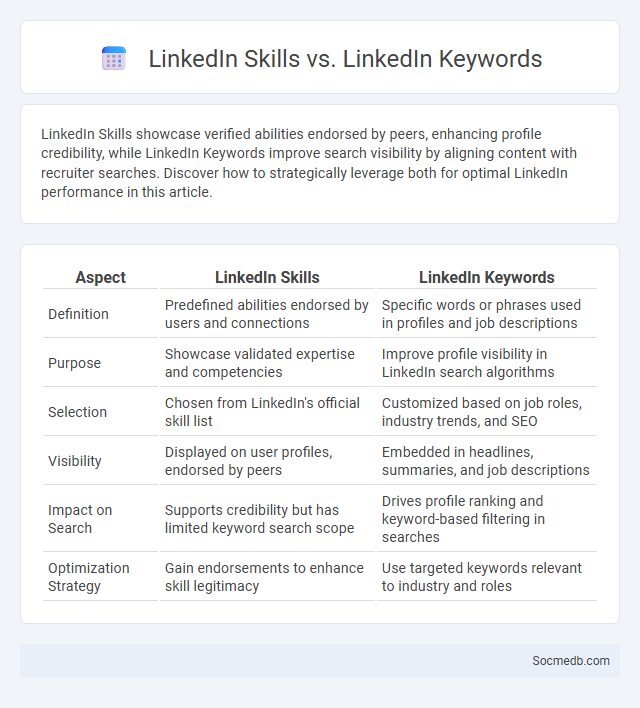
Photo illustration: LinkedIn Skills vs LinkedIn Keywords
LinkedIn Skills showcase verified abilities endorsed by peers, enhancing profile credibility, while LinkedIn Keywords improve search visibility by aligning content with recruiter searches. Discover how to strategically leverage both for optimal LinkedIn performance in this article.
Table of Comparison
| Aspect | LinkedIn Skills | LinkedIn Keywords |
|---|---|---|
| Definition | Predefined abilities endorsed by users and connections | Specific words or phrases used in profiles and job descriptions |
| Purpose | Showcase validated expertise and competencies | Improve profile visibility in LinkedIn search algorithms |
| Selection | Chosen from LinkedIn's official skill list | Customized based on job roles, industry trends, and SEO |
| Visibility | Displayed on user profiles, endorsed by peers | Embedded in headlines, summaries, and job descriptions |
| Impact on Search | Supports credibility but has limited keyword search scope | Drives profile ranking and keyword-based filtering in searches |
| Optimization Strategy | Gain endorsements to enhance skill legitimacy | Use targeted keywords relevant to industry and roles |
Introduction to LinkedIn Skills, Keywords, and Optimization
LinkedIn skills and keywords play a crucial role in enhancing profile visibility and attracting potential employers or collaborators. Proper optimization of these elements involves strategically incorporating industry-specific terms and relevant competencies to match job market demands. Effective use of LinkedIn's skill endorsements and keyword integration boosts search rankings and professional credibility within targeted networks.
Defining LinkedIn Skills: What They Are and Why They Matter
LinkedIn skills represent specific abilities and expertise you add to your profile, showcasing your professional strengths to recruiters and industry peers. These skills enable LinkedIn's algorithm to match your profile with relevant job opportunities and networking connections more effectively. Highlighting your skills accurately helps your profile gain credibility, increasing your chances of being discovered by potential employers and collaborators.
Understanding LinkedIn Keywords: The Basics
LinkedIn keywords are terms and phrases that recruiters and algorithms use to find relevant profiles and content, making them essential for optimizing visibility. Incorporating industry-specific keywords, skills, and job titles in your LinkedIn headline, summary, and experience sections enhances search ranking and attracts targeted opportunities. Mastering keyword strategy on LinkedIn improves networking potential and career growth by aligning your profile with trending and role-specific search queries.
Key Differences: LinkedIn Skills vs LinkedIn Keywords
LinkedIn Skills are predefined attributes endorsed by connections, highlighting specific professional abilities such as project management or data analysis, whereas LinkedIn Keywords consist of custom terms strategically included in profiles to enhance search visibility and recruiter engagement. Skills provide credibility through endorsements, signaling verified expertise, while keywords optimize profile discoverability by aligning with industry-specific search queries. Understanding this distinction helps professionals effectively balance validation with SEO techniques to maximize LinkedIn profile impact.
The Role of Keyword Optimization on LinkedIn Profiles
Keyword optimization on LinkedIn profiles significantly enhances your visibility in search results, making it easier for recruiters and potential clients to find you. Strategically incorporating industry-specific keywords in your headline, summary, and experience sections aligns your profile with relevant job titles and skills. This targeted approach boosts your chances of appearing in LinkedIn's algorithm-driven recommendations and connection suggestions.
How LinkedIn’s Algorithm Uses Skills and Keywords
LinkedIn's algorithm prioritizes skills and keywords to enhance your profile's visibility in search results and recommendations. By incorporating relevant industry-specific keywords and endorsed skills, your profile aligns better with job opportunities and professional connections. Optimizing these elements increases your chances of appearing in recruiters' and potential collaborators' feeds.
Best Practices for Adding Skills and Keywords to Your Profile
Incorporate relevant industry-specific keywords and skill endorsements to enhance your social media profile's visibility in search algorithms. Use precise and varied terminology related to your expertise to attract recruiters and networking opportunities. Regularly update your skills section to reflect evolving competencies and include quantifiable achievements to demonstrate proficiency.
Common Mistakes in LinkedIn Keyword Optimization
Many LinkedIn users make the common mistake of overloading profiles with generic keywords instead of focusing on niche-specific terms that truly reflect their expertise. Ignoring the strategic placement of keywords in headlines, summaries, and experience sections reduces your profile's visibility in relevant search results. Proper keyword optimization enhances LinkedIn's algorithmic matching, helping recruiters and potential clients discover your professional skills effectively.
Enhancing Profile Visibility Through Skills and Keywords
Optimizing social media profiles by incorporating relevant skills and targeted keywords significantly boosts searchability and attracts the right audience. Highlighting industry-specific competencies and using frequently searched terms within profiles enhances algorithmic ranking and increases profile views. Strategic keyword integration ensures that recruiters and potential collaborators easily discover profiles aligned with their interests and needs.
Strategic Tips for Mastering LinkedIn Profile Optimization
Optimizing your LinkedIn profile strategically involves crafting a compelling headline with targeted keywords that reflect your industry expertise and career goals. Ensure your summary highlights your unique value proposition, incorporating relevant skills and accomplishments to attract recruiters and business connections. Use a professional photo, customize your URL, and regularly update your experience to keep Your profile visible and engaging in LinkedIn's search algorithm.
 socmedb.com
socmedb.com